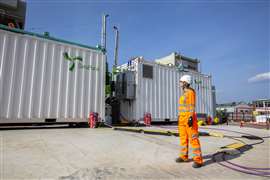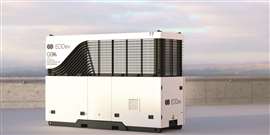Hydrogen fuel cell power in construction
12 February 2025
At the HS2 Victoria Road Crossover Box site in West London, two white shipping containers hum with activity. Unlike the cranes and traditional equipment surrounding them, these containers house hydrogen fuel cell power units (HPUs), providing emissions-free electricity to the site.
 GeoPura HPUs deployed at the HS2 site. Photo: GeoPura
GeoPura HPUs deployed at the HS2 site. Photo: GeoPura
Hydrogen fuel cells have long been used in transportation, powering buses, trucks, and even trains.
Now, they are gaining traction in the construction and rental industries, particularly as an alternative to diesel generators on job sites.
Rental companies are increasingly exploring hydrogen-powered solutions as part of the sector’s broader shift towards sustainability.
Hydrogen fuel cells in construction
The push for cleaner energy sources has led OEMs and rental companies to consider hydrogen-based alternatives.
XCMG, for instance, unveiled a fuel-cell-powered dump truck in 2023, while Hyundai Construction Equipment plans to showcase a hydrogen fuel cell excavator at Bauma 2025.
However, one of the most immediate applications for hydrogen fuel cells is replacing diesel generators—an area where rental companies play a key role.
UK-based GeoPura, a clean energy company launched in 2019 in partnership with Siemens Energy Ventures, has been deploying HPUs in various sectors, including construction, live events, and film production.
In addition to the HS2 Victoria Road site, GeoPura’s units are in operation at other HS2 locations in Aylesbury, with customers including National Grid, BAM Nuttall, and Balfour Beatty.
Matt Barney, chief hydrogen business officer at GeoPura, emphasizes the need for alternative fuels:
“Ultimately, if we’re going to wean ourselves off fossil fuels, then zero-emissions fuels have to play a part in that spectrum. We need to start supporting more energy-hungry applications, whether that be in construction or for data centers, and so we need a fuel as part of that mix.”
Hydrogen in equipment rental
To scale its hydrogen offerings, GeoPura secured $71 million in funding in early 2024, with additional debt financing bringing total recent investments to nearly $100 million.
The company aims to expand its fleet to 3,600 HPUs by 2033. GeoPura also produces its own hydrogen at sites in Nottinghamshire and Yorkshire, with a fleet of 80 tankers delivering fuel to customers.
 Matt Barney, chief hydrogen business officer at GeoPura. Photo: GeoPura
Matt Barney, chief hydrogen business officer at GeoPura. Photo: GeoPura
“We’d like to see a whole network of small-scale electrolyzers in the short to medium term,” Barney said. “But we’re very much aware of what other players are doing in this space, as well, with much larger projects.”
GeoPura isn’t the only company bringing hydrogen-powered solutions to the markets.
French company EODev, a spin-off from the Energy Observer project, supplies GEH2 hydrogen power units to rental firms like United Rentals, Loxam, and Kennards Hire.
Meanwhile, UK-based AFC Energy has reported $33.5 million in orders for its 30kW HPUs in 2024, including contracts with Acciona and a partnership with Middle Eastern distributor TAMGO.
AFC Energy also supplies hydrogen generators to Speedy Hire through a 50/50 joint venture.
Equipment manufacturers are also exploring hydrogen-powered generators. Hitachi Energy and PowerCell Group announced a partnership in April 2024 to develop the Hyflex hydrogen fuel cell genset.
Yanmar Energy Systems introduced a fuel cell power generation system later in the year, while Caterpillar is working with Microsoft and Ballard Power Systems to test hydrogen fuel cells for backup power in data centers.
Challenges in hydrogen adoption
Despite the growing interest in hydrogen-powered equipment, adoption faces hurdles. One key challenge is hydrogen availability—many green hydrogen production projects have struggled to scale.
Additionally, hydrogen fuel cell adoption is caught in a chicken-and-egg dilemma: hydrogen suppliers hesitate to expand production without guaranteed demand, while OEMs and rental firms worry about fuel accessibility.
 United is adding hydrogen powered zero emissions EODev generators from Generac.
United is adding hydrogen powered zero emissions EODev generators from Generac.
GeoPura mitigates this issue by producing its own hydrogen, but cost remains a concern. According to Barney, running a diesel generator on a construction site costs about $2.04 per liter, while hydrogen sits at $2.96 per liter. Given the tight margins in construction, rental customers are highly sensitive to fuel costs.
Still, interest in hydrogen-powered solutions is growing.
“One hundred years ago, there were no gas stations in this country,” Barney noted. “But within a very short period of time, there was a petrol station on virtually every corner, in every street, every community. There was a tipping point that came where people needed that energy requirement.”
For rental companies looking to diversify their fleets and meet evolving sustainability regulations, hydrogen-powered equipment represents both a challenge and an opportunity. As infrastructure and production scale up, hydrogen fuel cells could become a viable alternative for reducing emissions in temporary power applications.
STAY CONNECTED



Receive the information you need when you need it through our world-leading magazines, newsletters and daily briefings.
CONNECT WITH THE TEAM







